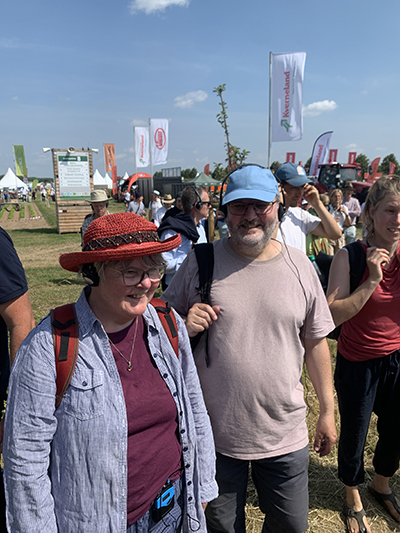The German Öko-Feldtage (Organic Field Days) is a biennial event – a two-day meeting point for the organic farming sector. Organised by a FiBL-led consortium and supported by the Saxon Government the 5th Organic Field Days were held near Leipzig on 18-19th June 2025 covering an area of 30 hectares with more than 360 exhibitors, around 650 demonstration plots, 40 machine demonstrations, 64 expert presentations, 57 workshops and network meetings and 130 guided tours. 19 innovations showcased new concepts to future-proof agriculture. With over 5,000 visitors on the first day the event demonstrated that despite the economic and political challenges that the sector is facing, organic farming in Germany is resilient and forward-thinking.
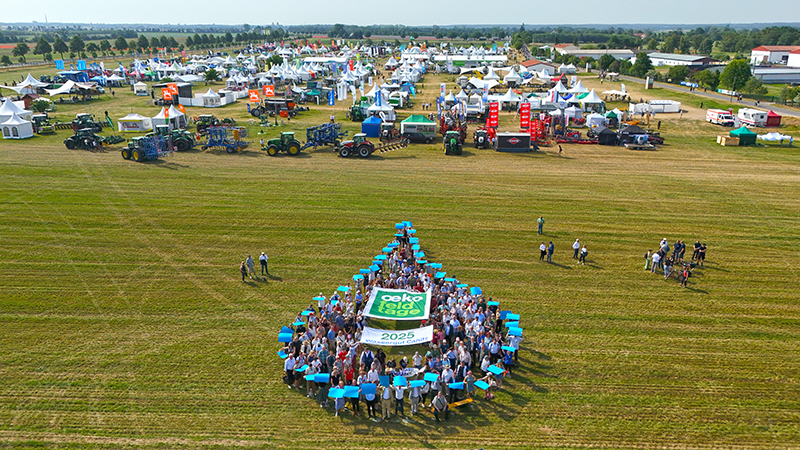
According to the Agricultural Market Information Company (AMI), the growth of the organic market in 2024 continued into the first quarter of 2025 – with a 9% increase in volume in the fresh produce sector compared to the same quarter of last year. According to Saxony Agriculture Minister Georg-Ludwig von Breitenbuch (CDU), the Saxony Government alongside the new federal Government is committed to the 30% organic farming target by 2030, as part of the German Sustainability Strategy, and therefore wants to strengthen the competitiveness of organic farming.
On a sweltering day in Saxony in June it was apposite that the Organic Field Days took the theme of Water. It was hosted by the Wassergut Canitz estate near Leipzig in eastern Germany, which has been organic since 1992. As a subsidiary of Leipziger Wasserwerke, supplying drinking water to the surrounding area and the city of Leipzig, water protection is their top priority.
The German Association of the Energy and Water Industries (BDEW) and the German Federation of Organic Food Producers (BÖLW) jointly sponsored the event.
“By sponsoring the Organic Field Days, the BDEW (German Federation of Water and Wastewater Industries) aims to highlight the shared concerns of drinking water protection and organic farming. The cooperation offers the opportunity for political and professional exchange – for example, on nitrate, plant protection, or conversion support. This is a strong signal, especially in times of increasing demands for resource conservation and security of supply,” says Martin Weyand, BDEW Executive Director for Water/Wastewater.
“Organic is an investment in the livelihoods of future generations. By avoiding the use of synthetic chemical pesticides and mineral fertilizers, organic farming effectively protects drinking water and water bodies” said Tina Andres, Chair of the BÖLW (German Federation of Organic Agriculture).
In March, IFOAM Organics Europe welcomed the European Commission’s intention, outlined in the Vision on Agriculture and Food, to publish a Water Resilience Strategy. Addressing Europe’s growing water crisis is crucial, as 63% of surface water bodies are still not in “good ecological condition”, despite existing legislation. The European Environment Agency recently identified agriculture as one of the main pressures on EU water resources and highlighted that the development of organic agriculture should be further supported to improve water resilience.
Jan Plagge, President of IFOAM Organics Europe, stated: “Organic farming can offer a systemic, effective solution to improve water quality, enhance water availability, and strengthen resilience to extreme weather events. Organic farming contributes to water resilience by reducing pollution, improving soil health, and supporting climate adaptation. By prohibiting synthetic fertilisers and pesticides, organic farming significantly reduces nitrate leaching and contamination of groundwater by chemicals, easing the financial burden of water treatments.” For instance, a study found that the cost on ground water pollution for a hectare of conventional potatoes amounts to 1298 €, while the same cost for a hectare of organic potatoes amounts to 0.4 €.”
Eduardo Cuoco, Director of IFOAM Organics Europe, emphasised that “the upcoming Water Resilience Strategy and relevant pieces of legislation should explicitly recognise organic farming as a key solution for water resilience, especially in areas affected by extreme weather events and water scarce areas”. He added: “Banning synthetic pesticides in water catchment areas is essential to safeguard drinking water and reduce the costs of groundwater depollution.”
IFOAM Organics Europe urged the European Commission to explicitly integrate organic farming into the Water Resilience Strategy as a core measure for protecting water quality, biodiversity, and climate resilience, as well as a means to considerably reduce costs related to ground water pollution. (See briefing highlighting the benefits of organic farming for water resilience)
My local water company OOWV (Oldenburg- East Friesian Water Board) had a stand at the show. They have been implementing a programme to expand organic farming in their drinking water catchment areas in north-west Germany since 2022. Due to limiting nitrogen applications organic farming contributes to compliance with the EU nitrate limit of 50 mg/l in groundwater. The benefits are particularly high in the OOWV area, as the sandy soils cause nitrogen to leach potentially leading to high nitrate concentrations in the groundwater. The focus is on consulting, continuing education, and public relations on the topics of organic farming and groundwater protection, but also on strengthening upstream and downstream sectors, and the development and marketing of organically produced ‘water protection products.’ One initiative of the project is the offer of free complete weed control services using the latest generation of weed harrows and hoeing equipment. This is particularly aimed at conventional maize farmers as degradation products of herbicides from maize cultivation are frequently detected in the near-surface groundwater in the region and pose a potential threat to the quality of the drinking water.
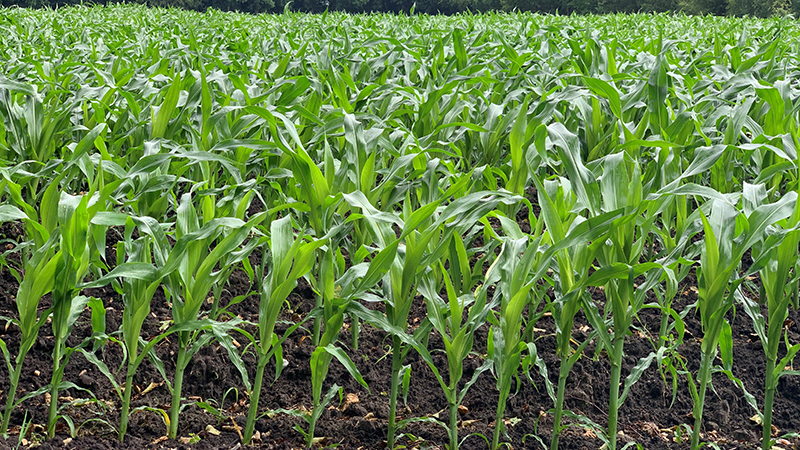
“These organic field days have once again clearly demonstrated to many farmers that water management has become a central challenge in all areas of primary agricultural production. Policymakers have received indications, almost a clear mandate, as to why, on the one hand, preventive water conservation should be rewarded. On the other hand, practical water management strategies must be actively and promptly developed, and the framework conditions for this must be created, especially for land use systems in Germany. We at Wassergut are grateful that we were able to introduce our groundwater-conserving farming practices to so many visitors, as well as to politicians and businesses,” says Dr. Bernhard Wagner, Managing Director of Wassergut Canitz GmbH.
The demonstration areas for machines, autonomous robots, and AI-controlled technology showed how organic farming is future-proofing itself and how it manages the balance between modern technology and tradition. The numerous examples of innovations, from laser weeding robots in vegetable fields to weed control with targeted water jets in grassland, demonstrated the innovative strength of the industry.
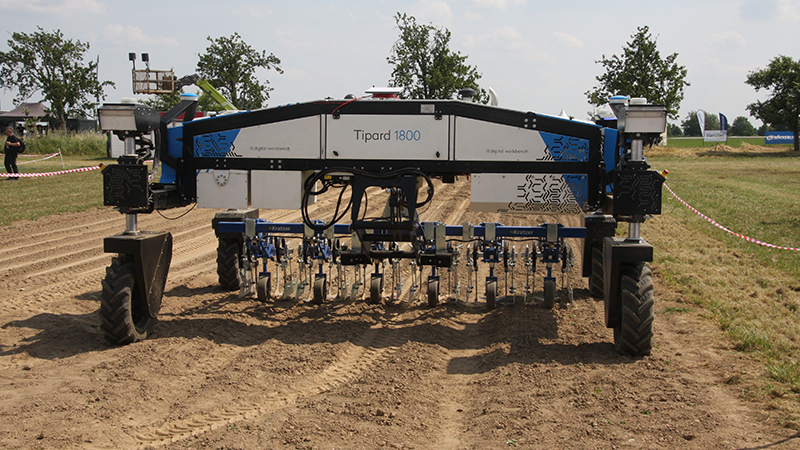
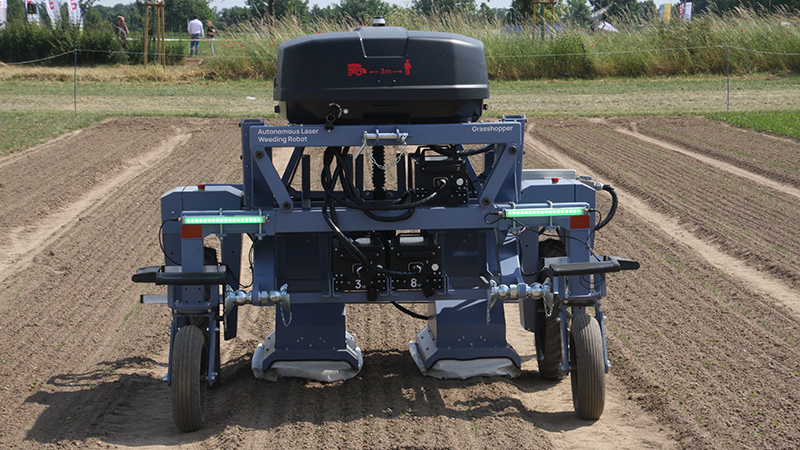
See full list of innovation examples (in German) here.
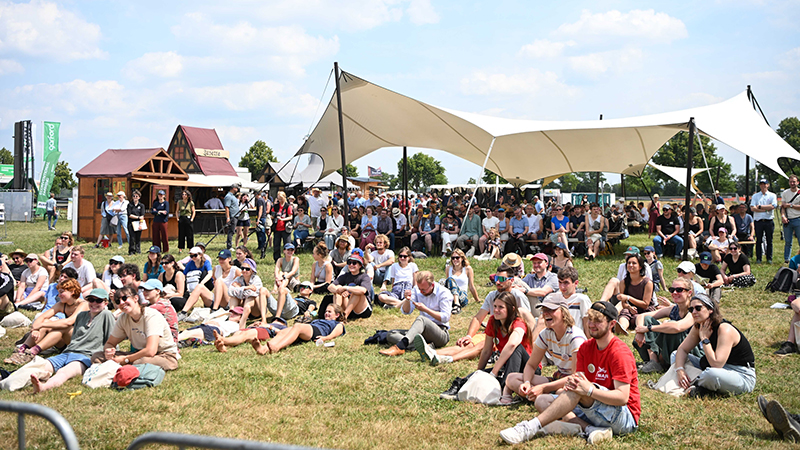
Youth played a major role at the 5th Organic Field Days: Job speed dating and networking events across the various organic associations showcased the ideas of the younger generation. For example, Johanna Zierl presented the Organic Future Camp‘s visions of the future to Dr. Burkhard Schmied from the Federal Ministry of Agriculture, Food and Home Affairs. “We have identified 16 future perspectives that urgently need to be addressed: from the right to land and political participation in food system transition,” said Zierl.
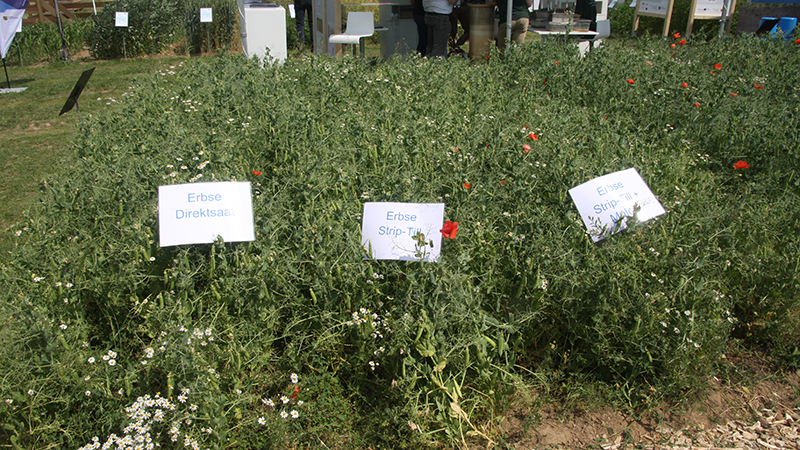
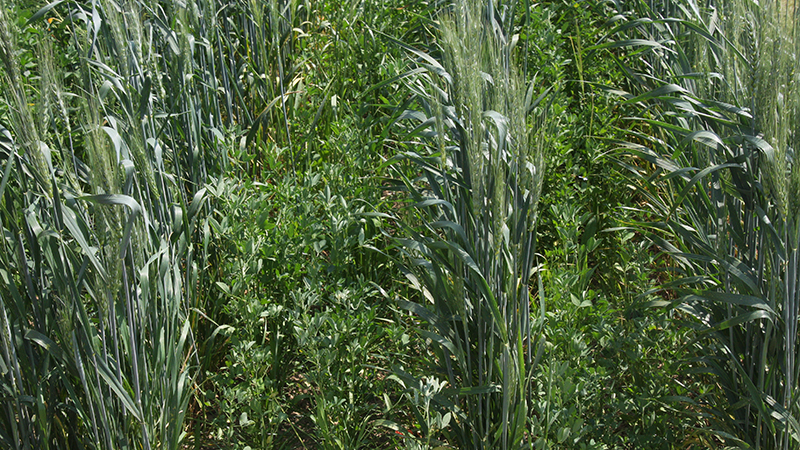
There were many stands and plots demonstrating the breadth of research into organic farming in Germany. Agroforestry is taking off in Germany and the networks are strong. Crop diversity and functional biodiversity, intercropping and living mulches are all hot topics and welcome diversions from the high tech kit. While the scale of the event was impressive – and one day was not enough to see it all – the developments and pace towards robotics and AI are quite mind-boggling. Organic farming has become quite mainstream in Germany and big business for machinery and Tech firms, but there is still room for biodiversity and smaller-scale solutions.
Vera Bruder, Managing Director of the organisers FiBL Projekte GmbH, draws a positive conclusion from the Organic Field Days: “We – together with our partners – were able to provide a great deal of impetus for the further development of organic farming. 362 exhibitors – we hadn’t expected that, especially at a time when the number of conversions isn’t increasing as hoped. At the same time, a quarter of our visitors farm conventionally. This demonstrates how open the exchange is. The connection between the younger generation’s visions of the future and the industry’s innovative spirit was particularly impressive.”
The day ended with a ‘Saxon evening’ with live music and a chance to catch-up with ex-ORC friends Nic Lampkin and Susanne Padel for a thirst-quenching water beer.
